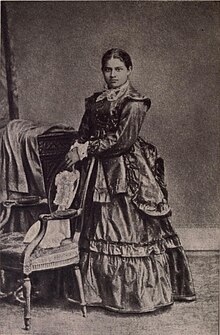Toru Dutt
| Toru Dutt | |
|---|---|
 |
|
| Born |
Tarulatā Datta March 4, 1856 |
| Died | 30 August 1877 (aged 21) Kolkata, Bengal, British India |
| Resting place | Maniktalla Christian Cemetery, Kolkata |
| Nationality | Indian British American |
| Occupation | Poet |
| Parent(s) | Govin Chunder Dutt (Father), Kshetramoni Dutt (Mother) |
Toru Dutt (Bengali: তরু দত্ত) (March 4, 1856 – August 30, 1877) was an Indian poet who wrote in English and French. She was born to father Govin Chunder Dutt and mother Kshetramoni of the Rambagan Dutt family. Toru was the youngest child after sister Aru and brother Abju. Romesh Chunder Dutt, writer and Indian civil servant, was their cousin. Their family became Christians in 1862.
In England she continued her higher French Studies. While living in Cambridge between 1871-3 she attended the Higher Lectures for Women at the University. Toru Dutt met and befriended Mary Martin, the daughter of Reverend John Martin of Sidney Sussex College. The friendship that developed between the two girls at this time continued in their correspondence after Toru’s return to India. A collection of Toru Dutt’s correspondence includes her letters written from England to her cousins in India.
Toru Dutt was a natural linguist and in her short life became proficient in Bengali, English, French and, later on, Sanskrit. She left behind an impressive collection of prose and poetry. Her two novels, the unfinished Bianca or The Young Spanish Maiden written in English and Le Journal de Mademoiselle d’Arvers, written in French, were based outside India with non-Indian protagonists. Her poetry comprises A Sheaf Gleaned in French Fields consisting of her translations into English of French poetry, and Ancient Ballads and Legends of Hindustan which compiles her translations and adaptations from Sanskrit literature.
A Sheaf Gleaned in French Fields was published in 1876 without preface or introduction. At first this collection attracted little attention. When her collection of Sanskrit translations Ancient Ballads and Legends of Hindustan was published posthumously in 1882 Edmund Gosse wrote an introductory memoir for it. In this he wrote of Toru Dutt: "She brought with her from Europe a store of knowledge that would have sufficed to make an English or French girl seem learned, but which in her case was simply miraculous."
...
Wikipedia
